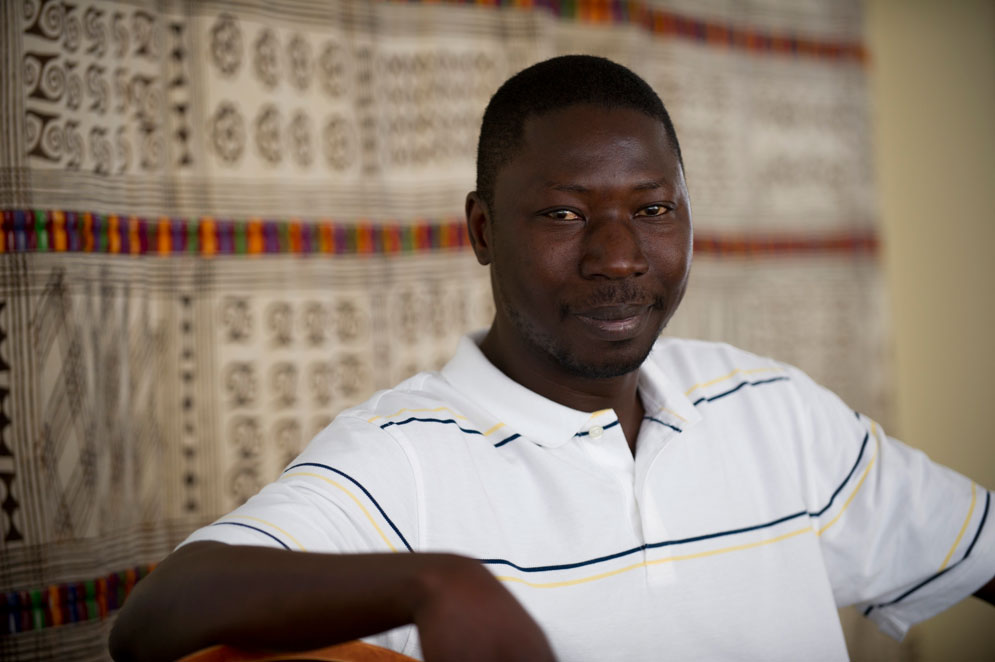African Studies Center Expands Curriculum
Two grants expand African language studies and fortify global partnerships

New funding from the US Department of Education will allow Fallou Ngom to add Mandinka, a major language of Muslim Africa, to the nine priority African languages now taught by Boston University’s African Studies Center. Photo by Cydney Scott
Boston University’s African Studies Center (ASC) recently received two significant federal grants that will allow it to expand its faculty and curriculum with the goal of increasing the number of well-trained Africanists in the humanities, social sciences, and professional fields. ASC was awarded over $2.2 million in Title VI grants, including $248,500 a year for four years from the US Department of Education’s National Resource Center program (NRC), and $303,000 a year for four years from its Foreign Language and Area Studies Fellowships program (FLAS).
Fallou Ngom, director of the African Studies Center at the Frederick S. Pardee School of Global Studies and a College of Arts & Sciences professor of anthropology, says the funding allows the center to add Mandinka, a major language of Muslim Africa, to the nine priority African languages that it now teaches. As a National Resource Center for Africa, he says, the African Studies Center will develop new Africa-related courses at BU Wheelock College of Education & Human Development and the University of Northern Colorado School of Teacher Education, and will continue to support Africa-related curriculum development at BU’s partner institutions, such as the University of Massachusetts–Boston, Roxbury Community College, Northern Virginia Community College, and the University of Puerto Rico–Cayey (all Minority Serving Institutions, as required by the grant). The center also hopes to expand certification courses for K–12 teachers, create online professional development courses and hold workshops, and partner with schools of education and offer teacher training on a variety of topics. The funding will help the center strengthen existing partnerships with universities in Ethiopia, Morocco, Niger, Senegal, South Africa, and Tanzania and develop new linkages in Gambia, Ghana, and Nigeria.
“I am particularly pleased that the BU African Studies Center is regarded by external reviewers as an unrivaled national leader, especially in the field of Ajami studies,” says Ngom. Despite the significance of Ajami literacy and documents in sub-Saharan Africa, Boston University’s African Language Program is the only one in the nation to teach Ajami literacy, train teachers in Ajami pedagogy, and develop high-quality Ajami teaching resources. Over the next four years, says Ngom, the African Studies Center will develop more courses and establish a peer-reviewed Journal of Ajami Studies to provide the nation’s students, teachers, and scholars access to perspectives generally unavailable in Arabic or in European and African language sources in Roman script. The Ajami Studies project at the center received an additional $250,000 grant from the National Endowment of the Humanities.
“I am honored to lead the BU African Studies Center as we implement pioneering initiatives that will bring the center to a new height in Africa-focused research, teaching, and service within and beyond the United States,” says Ngom. “I take this opportunity to recognize the hard work of all the staff members and language teachers of the center, and the enduring support of the office of the Pardee School dean, the CAS dean, and the provost that made this success possible.”

Comments & Discussion
Boston University moderates comments to facilitate an informed, substantive, civil conversation. Abusive, profane, self-promotional, misleading, incoherent or off-topic comments will be rejected. Moderators are staffed during regular business hours (EST) and can only accept comments written in English. Statistics or facts must include a citation or a link to the citation.